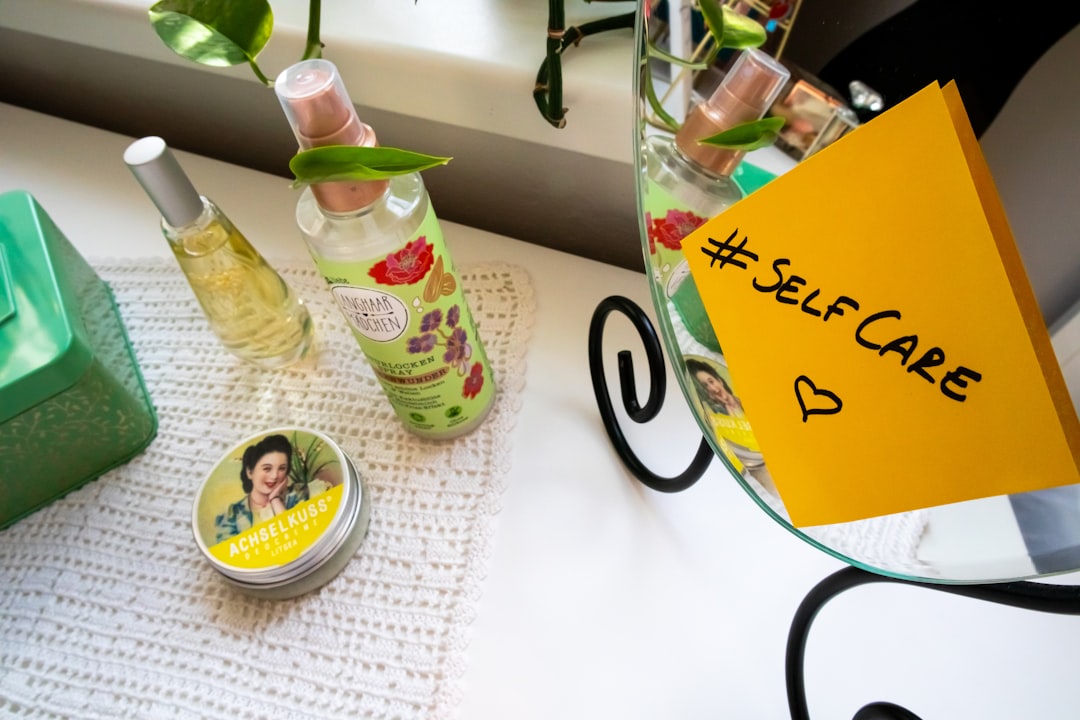Boost Your Mood with These #SelfCare Tips #mentalhealth #wellness #mindfulness

Taking care of our mental health has become more crucial than ever in the hectic & demanding world we live in today. Intentionally prioritizing our physical, emotional, & mental well-being is what is meant by the term “self-care,” which has become more and more popular in recent years. It entails realizing our needs & acting to satisfy them. Self-care is a necessary practice for preserving mental health; it is neither selfish nor indulgent.
Key Takeaways
- Self-care is important for maintaining good mental health.
- Practicing self-care can improve mood and overall wellness.
- Mindful meditation can help relieve stress and anxiety.
- Physical exercise is a powerful tool for boosting mood.
- Nourishing your body with healthy foods and hydration is essential for self-care.
Burnout, stress, & even mental health problems can result from continuously putting the needs of others before our own. We can avoid these undesirable effects & encourage a more positive and healthy way of thinking by engaging in self-care. Numerous and extensive advantages come with practicing self-care. We benefit from better mood and emotional control, less stress and anxiety, more energy & productivity, and an overall improvement in well-being when we take the time to care for ourselves.
We’ll go over these advantages in greater detail & offer helpful advice for implementing self-care into your daily schedule in this article. The favorable effects self-care has on our emotions and mental health are among its most obvious advantages. Prioritizing self-care makes us more resilient to life’s ups & downs and helps us to keep our emotions in check. We can elevate our mood and better control our emotions by doing things that make us happy & tranquil.
Self-care also aids in lowering anxiety and stress levels. Stress and anxiety are more likely to affect us when we disregard our own needs and continuously push ourselves to the limit. We can dramatically lower our stress levels & enhance our mental health by making the time to partake in relaxing and stress-relieving activities like meditation or spending time in nature. Moreover, self-care increases our vitality and productivity. We frequently experience feelings of being depleted and worn out when we disregard our own needs.
| Self-Care Tips | Mental Health | Wellness | Mindfulness |
|---|---|---|---|
| Get enough sleep | Reduces stress and anxiety | Improves overall health | Helps you stay present |
| Exercise regularly | Boosts mood and self-esteem | Increases energy levels | Improves focus and concentration |
| Practice gratitude | Reduces negative emotions | Increases happiness | Helps you appreciate the present moment |
| Connect with loved ones | Improves social support | Reduces feelings of loneliness | Helps you feel more connected |
| Take breaks | Reduces burnout and fatigue | Increases productivity | Helps you recharge and refocus |
We can boost our energy levels and enhance our general productivity by partaking in rejuvenating activities like working out or getting enough sleep. Self-care improves our general wellbeing. Prioritizing self-care makes it easier for us to take care of ourselves and meet our own needs.
A higher sense of contentment and happiness, as well as better physical health & self-esteem, result from this. Mindfulness meditation is one effective self-care technique that has attracted a lot of attention lately. Concentrating on the current moment and accepting it without passing judgment is the goal of mindfulness meditation. We can improve our mental clarity, lower stress and anxiety, and improve our general well-being by engaging in mindfulness meditation. There are many advantages of mindfulness meditation for mental health.
Studies have indicated that practicing mindfulness meditation on a regular basis can enhance concentration and attention span, lessen depressive & anxious symptoms, and promote feelings of serenity and relaxation. Also, studies have shown that practicing mindfulness meditation enhances emotional control & heightens self-awareness. Locate a calm, cozy area where you can sit or lie down to begin practicing mindfulness meditation. Shut your eyes & inhale deeply for a few moments, allowing your body to unwind and release any tension.
Pay attention to how your breath feels as it enters and exits your body as you start to concentrate on your breathing. Gently return your focus to your breathing without passing judgment if your thoughts stray. For a few minutes, keep up this practice, extending it progressively as you get more comfortable. A potent self-care technique that can greatly enhance our mental health is exercise, in addition to mindfulness meditation. Numerous studies have demonstrated the established relationship between exercise and mental health, highlighting the benefits of regular physical activity for lowering symptoms of anxiety and depression, elevating mood, and enhancing general wellbeing.
Exercise causes our bodies to release endorphins, which are organic substances that improve our mood. These endorphins support a sense of wellbeing by lowering stress and anxiety levels. Exercise also improves blood flow to the brain, which can lead to an increase in mental clarity & improved cognitive function.
To incorporate exercise into your self-care routine, find activities that you enjoy and that fit into your schedule. Engaging in physical activities such as yoga, team sports, or taking a stroll or jog could all count toward this. The secret is to find enjoyable activities that you can dedicate yourself to regularly.
As you gain comfort, progressively increase the duration and intensity of your workouts from small, attainable starting points. Sustaining good mental health requires not only exercise but also eating right & staying hydrated. Our general health & cognitive performance are directly impacted by the foods and beverages we ingest. Our mental health can be supported & a happier, more balanced mindset can be encouraged by feeding our bodies well & drinking plenty of water.
A diet high in fruits, vegetables, whole grains, and lean meats gives our bodies the nourishment they require to perform at their best. Packed with vitamins, minerals, and antioxidants, these foods promote brain function and lower inflammation, which has been connected to mental health problems like anxiety & depression. Sustaining good mental health also requires drinking enough of water and adhering to a nutritious diet.
Fatigue, difficulty focusing, and mood fluctuations can result from dehydration. Make sure you drink eight glasses of water or more if it’s hot outside or you’re doing physical activity. Making a self-care planner can be beneficial if you want to include self-care into your daily schedule in an efficient manner. Using a self-care planner is a useful tool for prioritizing & scheduling self-care tasks, which helps you make time for yourself and take care of your needs. The first step in making a self-care planner is to decide which self-care activities make you happy and relaxed.
This might be anything like spending time with loved ones, taking a bath, or reading a book. Put these activities in your planner and give them precise dates & times. Make sure to incorporate a range of activities that focus on various facets of self-care, including mental, emotional, and social wellbeing. Self-care activities that you can incorporate into your routine include: taking a walk in the outdoors; cooking healthy meals; cooking classes; cooking, painting, or writing; practicing mindfulness meditation; cooking; and spending time with loved ones. By making a self-care planner and adhering to it, you can make sure that you are prioritizing self-care & reaping the benefits of improved mental health and overall well-being.
For one to maintain good mental health, sleep & restful activities are just as important as exercise, food, and hydration. Our bodies and brains repair & rejuvenate while we sleep. We become more vulnerable to mood swings, decreased focus, & elevated stress levels when we don’t get enough sleep. To improve sleep quality, it is important to establish a consistent sleep routine. This entails setting a regular wake-up and bedtime for each day, including the weekends.
Also, establish a calming nighttime routine that enables you to de-stress & get ready for sleep. This could involve doing things like reading a book, having a warm bath, or working on relaxation techniques. In addition to prioritizing sleep, it is also important to incorporate restful activities into your self-care routine.
Restful activities are those that promote relaxation and rejuvenation, such as taking a nap, practicing deep breathing exercises, or engaging in a hobby that brings you joy. Your body & mind will be able to recover & perform at their best if you include these exercises into your daily routine. Another effective self-care technique that has the potential to greatly enhance our mental health is spending time in nature. There is ample evidence supporting the positive effects of being outdoors on mental health. Research has shown that spending time in nature can reduce symptoms of stress, anxiety, and depression, improve mood & overall well-being, and increase feelings of calm & relaxation. Make it a point to spend time outside on a regular basis to integrate nature into your self-care regimen.
A simple weekend camping trip, a gardening project, or a stroll in a local park could suffice. Disconnecting from technology & spending time in nature is crucial. Allow yourself to fully experience the present moment by taking the time to observe the sights, sounds, and smells of nature.
Gratitude and positive thinking exercises are two more effective self-care techniques that can greatly enhance our mental and general well-being. While positive thinking entails reframing negative thoughts & concentrating on the positive aspects of a situation, gratitude entails acknowledging & appreciating the positive aspects of our lives. There is substantial evidence connecting mental health and thankfulness. Empathy training has been demonstrated to enhance overall life satisfaction, lessen anxiety and depressive symptoms, and boost positive emotions and feelings of well-being. Also, research indicates that adopting a positive mindset can strengthen our capacity to withstand stress, boost our resilience, and elevate our self-worth.
Start by keeping a gratitude journal as a way to begin integrating gratitude and positive thinking into your self-care practice. Jot down three things for which you are thankful every day. These can be big or small, ranging from a lovely sunset to a thoughtful friendly gesture. By focusing on the positive aspects of your life, you can shift your mindset & cultivate a more positive and optimistic outlook. Self-care techniques are very helpful in preserving mental health, but it’s crucial to understand that they can’t take the place of expert assistance. Seeking professional help is crucial if you are dealing with severe or ongoing symptoms of depression, anxiety, or any other mental health issue.
Support & treatment for mental health issues can be obtained from a variety of mental health professionals. Therapists, counselors, psychiatrists, and psychologists are a few of these. It’s critical to select a professional who is a good fit for you because every one has a different area of expertise and treatment philosophy. There are resources available to assist you in finding mental health support if you are not sure where to begin. You can look for mental health professionals in your area based on your unique needs and preferences by using websites like Psychology Today and GoodTherapy. In addition, people looking for mental health support can access information & resources from groups like the National Alliance on Mental Illness (NAMI).
Self-care is an essential habit for preserving mental health, to sum up. We may greatly improve our mood, lessen stress and anxiety, boost our energy and productivity, & improve our general well-being by putting our own needs first and partaking in activities that encourage relaxation, joy, and well-being. There are many self-care activities that can improve our mental health, such as mindfulness meditation, physical activity, eating a balanced diet, & spending time in nature. It’s critical to develop a self-care regimen specific to our needs & to get expert assistance when necessary.
We are able to develop a more positive & health-conscious mindset when we prioritize self-care.
If you’re looking for more insights on self-care hashtags and how they can enhance your well-being, check out this informative article on HowToStart.digital. The article delves into the power of self-care hashtags in promoting mental health and self-love. It provides practical tips on using hashtags effectively and highlights the importance of finding a balance between online engagement and real-life self-care practices. Discover more about this fascinating topic by clicking here.
FAQs
What are selfcare hashtags?
Selfcare hashtags are hashtags used on social media platforms to promote self-care practices and encourage individuals to prioritize their mental, emotional, and physical well-being.
Why are selfcare hashtags important?
Selfcare hashtags are important because they help individuals to connect with others who are also prioritizing their well-being. They also provide a platform for individuals to share their self-care practices and inspire others to take care of themselves.
What are some popular selfcare hashtags?
Some popular selfcare hashtags include #selfcare, #selflove, #mentalhealth, #mindfulness, #wellness, #selfcompassion, #selfacceptance, #selfimprovement, #selfhealing, and #selfawareness.
How can I use selfcare hashtags?
You can use selfcare hashtags by including them in your social media posts related to self-care practices. This will help your posts to be seen by others who are also interested in self-care and may inspire them to prioritize their well-being.
What are some examples of self-care practices?
Some examples of self-care practices include meditation, exercise, journaling, spending time in nature, getting enough sleep, eating a healthy diet, practicing gratitude, and spending time with loved ones.





